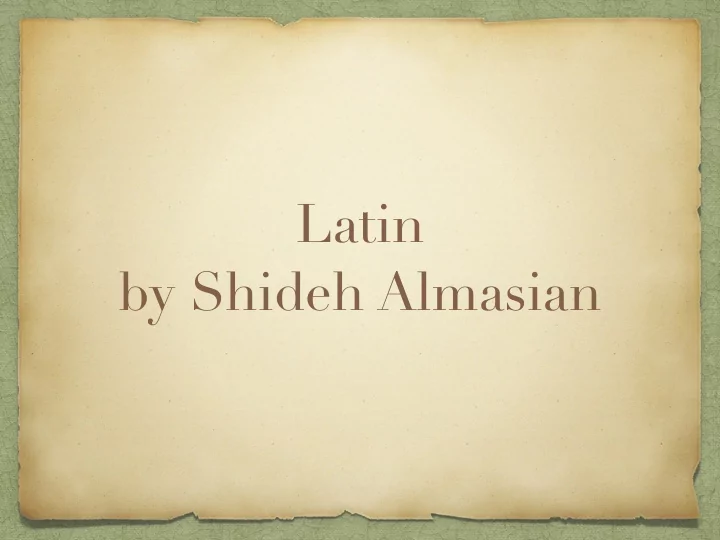

Latin by Shideh Almasian
History of Latin Originated -> From Latium Romance Languages -> descended from Latin Latin was lingua franca* -> later replaced by French (18th) -> then English (19th) official language of church and Vatican still used to create new names *learned language for scientific and political affairs
Vulgar Classical same time as Classical Latin late republic-first years of the empire Medieval Old Latin Renaissance 75BC Contemporary New Latin Nowadays until the end of the 17th century
Latin Alphabet Adapted from Etruscan alphabet Y and Z taken from the Greek alphabet Direction : right to left J variant of I.U variant of V , W was introduced as a ‘double-v’. the letters J, U ,W were added to the alphabet at a later stage -> languages other than Latin.
Is it alive ? Dead! -> no longer spoken in the forms found in the ancient writings. old form -> has no native speakers slowly evolved to -> Italian, Spanish, French, Romanian
Latin Today Most course -> focus on translating to modern languages Living Latin Movement Radio Bremen in Germany, YLE radio in Finland, and Vatican Radio & Television Some films of ancient settings, such as Sebastiane and The Passion of the Christ. official language -> Holy See ->its public journal, the Acta Apostolicae Sedis,Roman Rota. Vatican City - >world’s only automatic teller machine that gives instructions in Latin.
Corpus and Tools Open Greek and Latin Project ( http://www.dh.uni-leipzig.de/wo/projects/ open-greek-and-latin-project/ ) CLTK Latin linguistic data (http://docs.cltk.org/en/latest/latin.html)(NLP Tool) Musisque deoque (http://www.mqdq.it) Library of Latin Texts (CTLO 2010)(private) Bibliotheca Teubneriana Latina (CETEDOC 1999),(private) Perseus Digital Library Bamman and Crane 2008(http:// www.perseus.tufts.edu) Index Thomisticus (http://www.corpusthomisticum.org/) LatinISE : a Latin corpus for Sketch Engine(NLP Tool)
Voice of Latin : Omnes homines dignitate et iure liberi et pares nascuntur, rationis et conscientiae participes sunt, quibus inter se concordiae studio est agendum. (All human beings are born free and equal in dignity and rights. They are endowed with reason and conscience and should act towards one another in a spirit of brotherhood. )
Reference Tools for historical corpus research, and a corpus of Latin (Barbara McGillivray / Adam Kilgarriff) Wikipedia on Latin Language What Is an Endangered Language?(Anthony C. Woodbury)
Recommend
More recommend